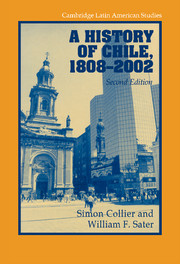Book contents
- Frontmatter
- Contents
- List of maps
- Preface to the Second Edition
- A note on geography
- CAMBRIDGE LATIN AMERICAN STUDIES
- PART I Birth of a nation-state, 1800s–1830s
- PART II The rise of a republic, 1830s–1880s
- PART III The nitrate era, 1880s–1930s
- PART IV Industrial advance and the dawn of mass politics, 1930s–1960s
- PART V Democracy and dictatorship, 1960s–2000s
- 11 Revolution in liberty, 1964–70
- 12 The Chilean road to socialism, 1970–73
- 13 The Pinochet years
- 14 Re-encounter with history, 1990–2002
- Glossary of Spanish terms
- Initials and acronyms
- Further reading
- Index
14 - Re-encounter with history, 1990–2002
Published online by Cambridge University Press: 05 June 2012
- Frontmatter
- Contents
- List of maps
- Preface to the Second Edition
- A note on geography
- CAMBRIDGE LATIN AMERICAN STUDIES
- PART I Birth of a nation-state, 1800s–1830s
- PART II The rise of a republic, 1830s–1880s
- PART III The nitrate era, 1880s–1930s
- PART IV Industrial advance and the dawn of mass politics, 1930s–1960s
- PART V Democracy and dictatorship, 1960s–2000s
- 11 Revolution in liberty, 1964–70
- 12 The Chilean road to socialism, 1970–73
- 13 The Pinochet years
- 14 Re-encounter with history, 1990–2002
- Glossary of Spanish terms
- Initials and acronyms
- Further reading
- Index
Summary
I think you are a bit confused, Heredia.
Who isn't confused in these times?
– Ramón Díaz Eterovic, El ojo del alma (2001).Friend of the elves, 1990–94
The coalition that assumed power in March 1990 would elect two further presidents over the next decade: the Christian Democrat Eduardo Frei, and, following him, the Socialist Ricardo Lagos. While these Concertación governments had to operate within the constraints inherited from the Pinochet regime (the 1980 constitution and the economic “model”), they strove very hard to modify its legacies. The first Concertación president, the septuagenarian Patricio Aylwin, was the first in Chile's history to have an English surname – an ancient one, with the prime meaning of “friend of the elves,” or the subsidiary meaning of “good friend.” The elves, albeit creatures of Nordic rather than Latin mythology, may possibly have given him some help. It is tempting to compare him, despite definite differences of demeanor, with the emollient nineteenth-century president José Joaquín Pérez. His task was in some ways similar, in some ways more daunting. Aylwin's clear head, his patience, his negotiating talent, his mildly ironic smile – these assets were invaluable to the country as it took its first steps back to what Aylwin himself, in his moving televised address on New Year's Eve 1990, termed Chile's “re-encounter” with its history.
- Type
- Chapter
- Information
- A History of Chile, 1808–2002 , pp. 390 - 414Publisher: Cambridge University PressPrint publication year: 2004



